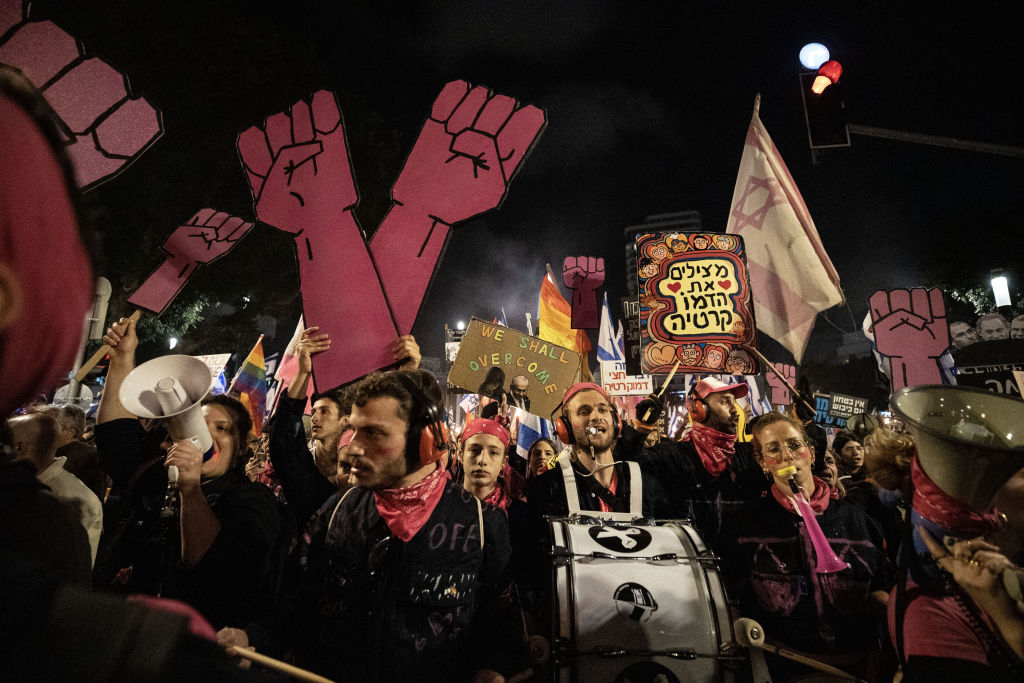
You’ll need to book at least two weeks in advance if you want to have dinner at “a”, one of Tel Aviv’s top restaurants. A table on Saturday night is almost impossible to get. A few weeks ago, Chef Yuval ben Neriah announced that the hottest place in Tel Aviv will close its gates on Saturday evenings. And the reason is Benjamin Netanyahu.
Over the last eight weeks, every Saturday, more than a hundred thousand Israelis rallied the streets of Tel Aviv, protesting Netanyahu’s plan to shatter the states’ legal system. As they fill the streets with signs of “Crime Minister,” referring to the PM’s own corruption trials, some of them try to provoke those sitting in nearby pubs and restaurants: “It’s not the time to drink wine, we’re fighting over democracy.” Chef Neriah, whose restaurant is nested at the heart of the demonstration route, seems to agree. “Saturdays in Tel Aviv have changed. We are changing. It is time for democracy.” Some claimed that Neriah’s decision, posted on social media, was just pure business. Others saw it as an important message to the satiated Israeli public—some things are even more important than your dinner.
Israeli civil society is facing severe danger. Racists, homophobes, and inciters are holding top positions in Netanyahu’s new government, aiming to change the country’s face forever. Yariv Levin, Bibi’s new justice minister, announced a plan to hand more power to lawmakers in overriding Supreme Court decisions and appointing judges. The plan threatens judicial independence and the credibility of the court system and jeopardizes minority rights. On February 12, President Yitzhak Herzog gave a rare speech to the nation, saying the judicial reform raises grave concern for future of Israeli democracy. Herzog, former head of the Labor party, called to halt the legislative process in order to reach a compromise. The Supreme Court Chief Justice and the state’s Attorney-general are also opposing the plan, stating it will ruin the democratic checks and balances of the state. As Israel doesn’t have a constitution, the Supreme Court is the main statutory establishment effectively limiting state power.
The one good thing about Netanyahu’s ongoing attack on the judicial system is the effect it had on the Israeli public. For years, Israeli liberals were compared to the frog in the slowly boiling water: too cozy to jump until it’s too late. When changes occur gradually, it is easy to underestimate their meaning and to overlook the danger. But this time, Netanyahu’s acts were as swift and aggressive as a sudden dip in steaming hot water; at last, it made us jump.
More from TIME
Read More: Israeli Democracy May Not Survive Netanyahu’s Government
Our society is finally starting to wake up. The biggest threat to the civil protest is not Netanyahu, nor the bunch of idealogues and hate-mongers surrounding him. The biggest threat is despair. After years of Netanyahu regime, there’s a whole generation of Israelis that cannot even remember how the state looked like before the age of populism. Five election campaigns over five years have exhausted the Israeli public. Those who celebrated Netanyahu’s defeat in 2021 soon saw Bibi back in power—and just like in a horror movie, he returned stronger than ever. The first reaction was shock. Then despair. Ironically, of all people, it was Netanyahu himself who woke the opposition from its desperate state of mind. It was thanks to him that the public is taking action. Despair turned into anger, and anger is a powerful fuel.
Now, civil organizations are trying to figure out how to use this fuel to move forward. Yuval Noah Harari argued that the study of history can be summoned into one question—how do changes occur? As an Israeli, I ask myself this question repeatedly. Can Saturday night rallies create a real change, or are we required to do more than that? It is often said that you can’t win a fight if you’re not willing to risk anything. Are we willing to risk more than a Saturday night dinner?

The first ones to take a real risk were schoolteachers. Over 660 teachers announced that they won’t cooperate with educational programs that contradict democratic values. The announcement came shortly after the external education programs unit was handed over to Noam party leader MK Avi Maoz. Maoz is one of Israel’s most extreme right politicians, known for his anti-LGBT attitudes, and his approach against “progressive” ideas such as women serving in combat roles in the IDF.
The schoolteachers who signed the petition were willing to risk their jobs in order to protect their values. Many parents supported the cause, but some feared that the education ministry will withdraw budgets from schools labeled as “ideologically problematic”. Fear became a common fragrance also in the ministry of culture: newly appointed minister Miki Zohar, has already asked to withdraw funding from a documentary film that criticizes Israeli soldiers.
Film directors and educators are quite often involved in the country’s political debates. More surprising is how the Israeli tech world, which has always attempted to remain beyond politics, is starting to turn against Bibi. During the past five election campaigns, it was rare to hear a tech tycoon expressing his or her political agenda. But Netanyahu’s plan to weaken the legal system managed to shake even the most neutral sector in the country. On January 24, Thousands of high-tech workers participated in a one-hour strike organized by industry executives. Tech sector employees took to the streets, protesting the government’s plans to overhaul the judicial system. Over 130 Israeli companies allowed their workers to participate. Prominent entrepreneurs took part, including the founders of cybersecurity unicorn Wiz, Assaf Rappaport and Yinon Costica, who led a big group of company employees.
For three consecutive weeks, Tuesday Tech-protesters have been demonstrating at various locations—Sarona complex in Tel Aviv, the Airport City business park, a high-tech complex in Herzliya, and the University of Haifa. many of the protesters carry flags. Some hold signs saying, “Save our startup nation” and “No balances—no checks.” The latter didn’t remain a slogan—on February 6, Cybersecurity giant Wiz decided to pull cash out of Israel and transfer its business accounts out of the country. CEO Assaf Rappaport, former head of Microsoft’s development center in Israel, said investors pressured management to take precautions against the uncertainty over the planned judicial reform.
Wiz is joining another unicorn, Papaya Global, a global payroll and payment management platform based in Israel, which plans to withdraw all its funds from the country. Israeli VC’s Disruptive and Disruptive AI have previously announced a similar decision.
For a small, dynamic economy, these announcements came as a complete shock. There’s a huge difference between a lunchtime protest and pulling money out of a country. And they did it not just for moral reasons but quite simply because the fear that weakening of the judiciary system will create uncertainty and reduce the likelihood that foreign investors will inject funds into local businesses. This in turn could force local and international businesses to leave, resulting in a severe crisis.
The Israeli tech industry is the engine that for 20 years has pushed the entire train forward. Netanyahu himself takes pride in the country’s thriving tech society, presenting it as an economic miracle. Now, the people in charge of this miracle are revolting against him. The fact that such drastic moves are taken by people known to be calculated and reasonable, may make even some right-wing voters question the government’s plan.
Aiming for a wide base of support, the protest organizers asked the public not to raise the Palestinian flag and to avoid slogans against the occupation. For the protest to succeed, they say, we need to unite as many Israelis as possible, including right wing voters. While many protesters agree, others emphasized how impossible it is to differentiate between the occupation of the West Bank and the democratic crisis Israeli is going through. Many Arab citizens of Israel decided not to join the protest, since it neglects the Palestinian cause and focuses only on issues important to the Jewish majority.
People continue to take to the streets every weekend, with the protests on Saturday Feb. 25 being hailed as the largest yet, over where over 150,000 people showed up in Tel Aviv. This is a true challenge for Israeli society—can we resist peacefully, yet loud enough to make it impossible to ignore us?
More Must-Reads from TIME
- Cybersecurity Experts Are Sounding the Alarm on DOGE
- Meet the 2025 Women of the Year
- The Harsh Truth About Disability Inclusion
- Why Do More Young Adults Have Cancer?
- Colman Domingo Leads With Radical Love
- How to Get Better at Doing Things Alone
- Michelle Zauner Stares Down the Darkness
Contact us at letters@time.com